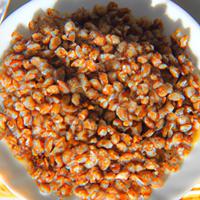
1 serving (100 grams) contains 111 calories, 3.6 grams of protein, 0.4 grams of fat, and 24.5 grams of carbohydrates.

Log this food in SnapCalorie

Nutrition Information
Calories |
222 | ||
|---|---|---|---|
% Daily Value* |
|||
| Total Fat | 0.8 g | 1% | |
| Saturated Fat | 0.2 g | 1% | |
| Polyunsaturated Fat | 0 g | ||
| Cholesterol | 0 mg | 0% | |
| Sodium | 6 mg | 0% | |
| Total Carbohydrates | 49 g | 17% | |
| Dietary Fiber | 7.6 g | 27% | |
| Sugars | 0.2 g | ||
| protein | 7.2 g | 14% | |
| Vitamin D | 0 mcg | 0% | |
| Calcium | 22 mg | 1% | |
| Iron | 2.6 mg | 14% | |
| Potassium | 248 mg | 5% | |
* Percent Daily Values are based on a 2,000 calorie diet. Your daily values may be higher or lower depending on your calorie needs.
Food Attributes
Source of Calories
About Cooked wheat berries
Cooked wheat berries are whole kernels of wheat loaded with essential nutrients and a nutty, chewy flavor. Originating from the core ingredient in many ancient cuisines, they’ve been a staple in diets across Europe, the Middle East, and parts of Asia. Packed with fiber, protein, and an array of vitamins and minerals like magnesium, iron, and B vitamins, wheat berries offer sustained energy and support digestion. As a whole grain, they provide complex carbohydrates without the processing found in refined grains, making them a heart-healthy option. Rich in antioxidants, they may help reduce inflammation and promote overall health. While wheat berries are naturally low in fat, their calorie content is higher compared to some grains, so portion control is key for weight management. Versatile and satisfying, they can be used in salads, soups, or even as a hearty base for grain bowls.



